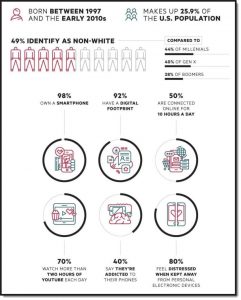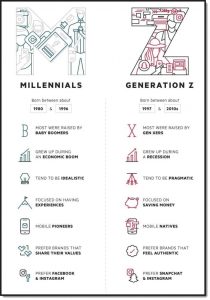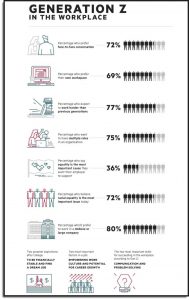While talk over the last decade has largely focused on understanding the work habits and attitudes of Millennials, it’s already time for a new generation to become the focus of attention.

Generation Z
Generation Z, the group born after the Millennials, is entering their early adult years and starting their young careers. What makes them different, and how will they approach things differently than past generations? Let’s start with a quick recap of the Generational landscape.
The Generations
The underlying belief is that generations share historical or social life experiences, the effects of which are relatively stable over the course of their lives. These life experiences tend to distinguish one generation from another. Because of this, we can’t readily predict when one generation will end, and another will begin or what will be enough of a change to tip us over the edge from one generation into the next.
Broadly accepted age definitions used by demographers and researchers are:
- Generation Z: Birth years; mid-1990s to mid-2000s. No consensus exists regarding ending birth years.
- Generation Y (Millennials); Birth years, early 1980s ending in the mid-1990s to 2000s.
- Generation X: Birth years; early-to-mid 1960s ending in early 1980s.
- Baby Boomers: Birth years; from early-to-mid 40s ending in early 60s.


The Generations
Generation Y (Millennials) compared to Generation Z
While generational differences cast a wide net and don’t necessarily apply to everyone, here is what demographers and researchers have identified as some of the key similarities and differences between Generation Z and Generation Y (Millennials).


Generation Y (Millennials) compared to Generation Z
We often talk about Generation Z as consumers but what can we expect when Generation Z becomes part of our workforce?
Generation Z does not remember a time when the internet did not exist – and as such, it’s not surprising to learn that 50% of Generation Z spends 10 hours a day connected online, and 70% watch YouTube for two hours a day or more.
Generation Z have some unique and somewhat unexpected traits. Generation Z prefers face-to-face interactions in the workplace and expects to work harder than past generations. Generation Z is also the most diverse generation (49% non-white) and values racial equality as a top issue. Finally, Generation Z is possibly one of the most practical generations, valuing things like saving money and securing stable employment.


What do Generation Z want from employment?

Adrian G Stewart
SOURCES:
mediakix.com, huffingtonpost.com, forbes.com, globalwebindex.com, businessinsider.com, thedrum.com, thinkwithgoogle.com, wpengine.netdna-cdn.com, inc.com, diversitybestpractices.com, adeccousa.com, medium.com
